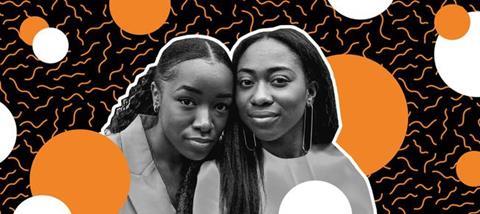
Ruth Jackson: What was your experience of God as a child?
Ore Ogunbiyi: As a young kid living in England I had lots of little Christian books from my auntie and grandma. My mum would take us to a church down the road. But when I moved to Nigeria, I went to church a lot more often. Church was a very cultural thing, but I loved it. I loved all the songs. I thought it was always very joyful. I was very shy at Sunday school but I learnt loads and I knew my biblical stories because of those little books. My mum was raised as a Catholic, my dad is Church of England. I was at Catholic school going to mass, I was in Nigeria going to Anglican churches, and in my own time and with my friends I was going to Nigerian Pentecostal churches! I call myself a bit of a denominational wanderer, but the important thing is I found God in all these places in different ways.
RJ: What was school like for you?
OO: I went to a private boarding school. Sometimes the perception of boarding schools is that they have a similar demographical makeup to elite universities. That wasn’t my experience. I went to a very diverse school and there was lots of pastoral care and support. There were lots of other black kids and especially Nigerian kids that I could relate to and I didn’t feel the same marginalisation as I did at university. University was a turning point for me and my relationship with my blackness – learning just how visible it was and just how much it would shape the way people see me and what my experiences of certain spaces are.?
Chelsea Kwakye: I’d say mine was exactly the same. I went to a very diverse state school. Going to Cambridge was a massive shock. I think it’s so important that we have a conversation about how it’s not just state versus private education. It’s much deeper and a lot more complex than that.?
OO: I went to school in Nigeria for a bit. My history teacher was black, but I was still learning about the Battle of Hastings and Harald Hardrada in my Nigerian classroom. I think it’s interesting to look at the implications of the national curriculum for beyond just the UK. Those things have ripple effects on former UK colonies, like Nigeria.
RJ: Did any of your teachers have a subconscious bias about what black students were capable of?
CK: I think it was very different in terms of young black men and women. I found that I was very much an exception, in the sense that I really did have teachers – white, black, Asian – rooting for me and telling me apply to Cambridge, but then you’d look at maybe the young black men and they were always in pupil referral units, always excluded and honestly for no reason at all. I can’t sit back and celebrate about getting into Cambridge when another young black boy or girl is being overlooked by their teachers.?
Society imparts all of its biases onto young black people and teachers can’t magically detach their biases. We need to work to deconstruct why we think that.?
RJ: Why did you feel like an impostor at Cambridge?
CK: Before university, I felt like I understood what it meant to be an imposter – always feeling like your achievements aren’t good enough, or that another person is more deserving of this place. But I didn’t really know how to articulate that before university. Once I got there, everything around me like the environment, seeing people who didn’t look like me, reading about people who didn’t have the same experiences that I did, just reinforced the idea that I was an exception or that I didn’t really belong, because it’s not seen as the norm.?
RJ: Taking Up Space talks about institutional racism. How would you explain it?
CK: I think especially within the UK we have this understanding that racism will be easily spotted. You’ll know when someone is racist, and you’ll be able to pinpoint that person, call them a racist and it’s all done. A lot of people don’t understand the covert methods of racism and how that feeds into our everyday lives. Institutional racism is almost insidious because it’s faceless. There’s no one to point a finger at, because it’s part of a wider system of power and privilege, and dismantling that literally means you have to dismantle a whole system. It will take forever, and it has taken forever. And I think it’s an endless fight.
RJ: What can we do to change that?
OO: I think it depends on who you are, what you do, where your position is in society. Everyone has a different role to play. Teachers have a responsibility to make sure they’re not prematurely hampering black children and their aspirations. Parents have a role to play in not forcing their kids down paths that they don’t want to go down. Friends have a role to support their black friends, by validating their feelings, but also just by listening. The Ministry of Education needs to be concerned about the implications of the national curriculum on our psyches and on our confidence as black students growing up in the UK.
CK: I think listening is so important. I think as soon as you hear the word ‘racism’ most people are on the defensive and I think this book just allows the opportunity to sit down, listen and reflect on what we say. It’s not meant to be reactionary. You just have to listen to understand our experiences and what we’ve been through.
RJ: Did you feel you had to work harder at university because you’re black?
CK: Definitely. And I almost felt like I had to be nicer too. I didn’t want to come across as ‘the mean one’ or too aggressive, with all of the stereotypes that surround black women.?
RJ: There’s been a huge rise in mental health struggles among students. Why is this a particular concern among young, black women?
OO: In many black families mental health isn’t something that is openly discussed. For example, it took me time to tell my mum that I thought something was going on, that I wasn’t OK. There’s also so much pressure on us, as black women, because “only this many black women got in this year”. I think sometimes you can internalise that pressure to do well, and it can be damaging. It’s also sometimes worse because the issues you’re facing might be to do with your race and there’s a lack of black counsellors.
I can’t sit back and celebrate about getting into Cambridge when another young black boy or girl is being overlooked
CK: I almost found that some aspects were normalised. In my mind I had very arbitrary levels of what was good mental health. I think I always compared it to others and thought “mine’s not that bad”. I thought I should be stressed, sleep-deprived and working 14 hours a day, but that is not normal at all! I think universities need to focus on how to at least implement some guidelines that suggest the best way to do university and to look after yourself at the same time.
RJ: Ore, you’ve been studying in the US where they have some black-only colleges and sororities. What do you think about these?
OO: HBCUs (historically black colleges and universities) are a unique example, and I don’t want to speak too much on them, given how different the situation is in America. I think having safe spaces and places that are just reserved for students to have as the closest thing to an escape from this ugly world is necessary. I think people have different ideas of what that safety looks like and what solidarity looks like. I really benefited, for example, from having the African Caribbean Society, which Chelsea and I ran in our third year. It was never said that it was exclusively black, but black culture was central to it. It was a very homely space for us, which we needed when Cambridge got isolating.
RJ: Do you think there’s a sense in which black majority churches could provide that for black Christians as well?
OO: 100 per cent. I’m saying that as someone who found my black majority church when I was at university. For me, it was a very important site of solace, and I found a lot of support in that church when I was at Cambridge. Even just going on a Sunday and hearing the same songs that I would hear as a kid meant a lot when I was really down and just felt alone. It was like another piece of my culture that I could bring.?
RJ: Is there any advice you’d give to young, black women who are thinking of applying to university?
OO: If you think you want to do it, do it. Sometimes the doubt can creep in and get the better of you, but the worst thing that can happen is you don’t get in. Find what you’re passionate about. I only pinned it down about a month before I wrote my personal statement, and that’s OK, but if there are things you think you’re really passionate about begin to investigate them, develop them, think about them, read about them. That’s how you’re going to thrive on the application.
CK: I think maybe on a practical level just try and find out as much information about the university as possible. I didn’t find out about the city. I always used to look into the university, but I didn’t look into what Cambridge would be like. I think that added to the shock.










































